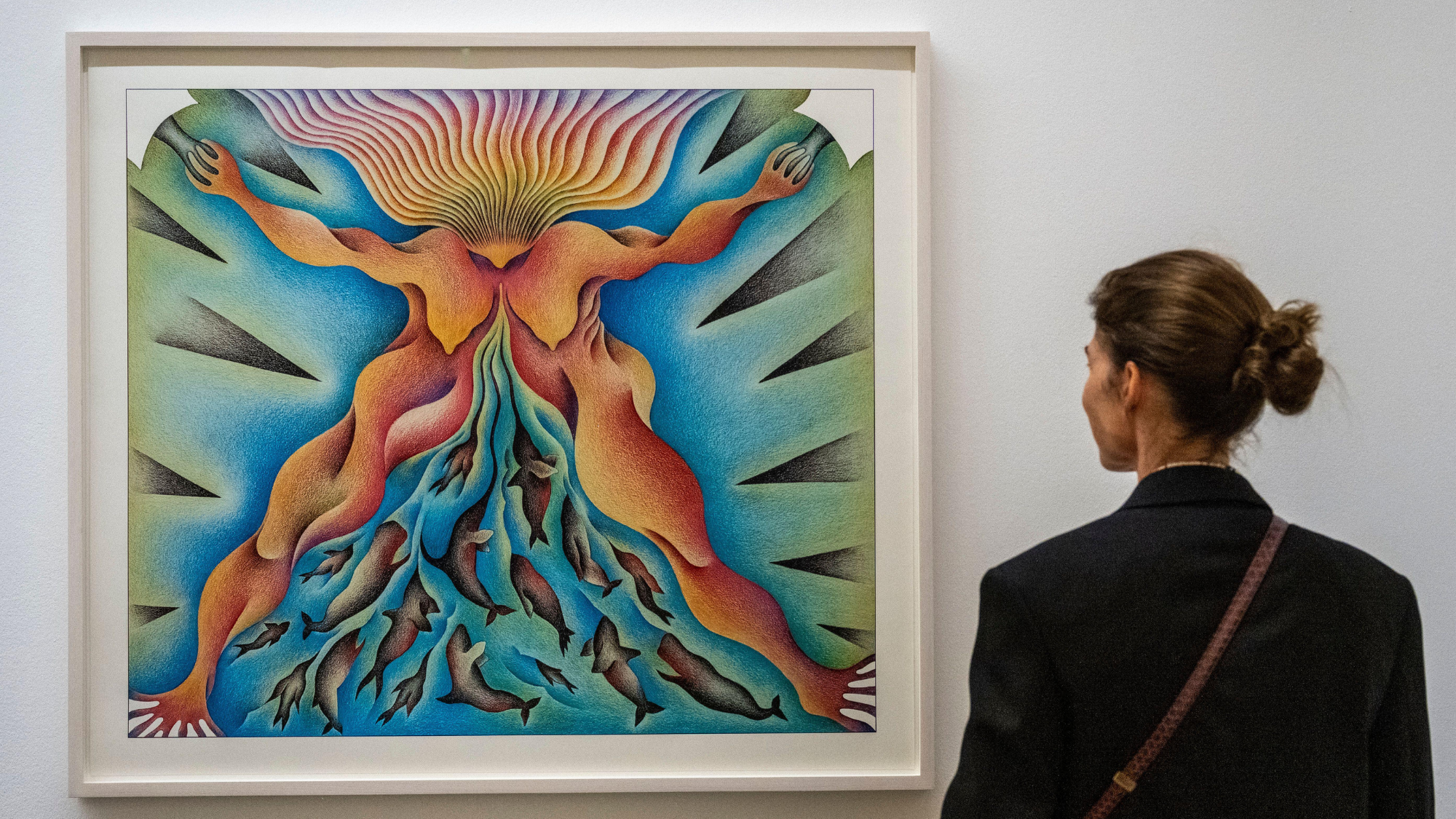Judy Chicago: Revelations – an 'absorbing' show from a pioneering feminist artist
The new exhibition contains some 200 paintings, drawings and installations

A free daily email with the biggest news stories of the day – and the best features from TheWeek.com
You are now subscribed
Your newsletter sign-up was successful
For 60 years, the American feminist artist Judy Chicago has been making "thunderous art driven by the certainty that men are bad and women are good", said Waldemar Januszczak in The Sunday Times. Born Judith Cohen to liberal Jewish parents in Chicago in 1939, she adopted the name of her home city "as an act of American camouflage" and, from the 1960s, sought to create a form of art that went against the grain of tasteful, male-dominated modernism. Once derided by the art establishment, Chicago's angry, unsubtle and frequently thrilling work is finally getting the recognition it deserves.
This new exhibition confirms her as an artistic "pioneer" possessed of a "particularly intense" imagination. Taking as its starting point an unpublished illuminated manuscript from the 1970s that retells the "Book of Genesis" from a feminist perspective – it begins in a paediatric unit – the show contains some 200 paintings, drawings and installations created over the course of her career. Its exhibits tear "into men and their history with unconfined zest"; the result is a "weird" and "impactful" event.
"Intense" is the operative word here, said Alastair Sooke in The Telegraph. Much of the work in this "absorbing" show revolves around childbirth, an "iconographic void within art history", which Chicago "admirably sought to fill". A case in point is 1982's "In the Beginning", a 32ft-long "primordial panorama" in which "a newborn suckles on lava-coloured nipples" and tiny creatures "spew from a suggestive chasm". Or there's "The Crowning" (2010), a work at once "like a vorticist painting and a Mayan relief": an "unforgettable" vision of a baby's head emerging during birth. This is a sometimes "mesmerising" show, even if Chicago's depictions of men as "grimacing, nose-picking, sloppily urinating horrors" are "caricatured and ludicrous", and her thoughts on climate change "have the nuance of a placard".
The Week
Escape your echo chamber. Get the facts behind the news, plus analysis from multiple perspectives.

Sign up for The Week's Free Newsletters
From our morning news briefing to a weekly Good News Newsletter, get the best of The Week delivered directly to your inbox.
From our morning news briefing to a weekly Good News Newsletter, get the best of The Week delivered directly to your inbox.
Chicago can be "crude" and sometimes unforgivably "twee", said Laura Cumming in The Observer. "What if Women Ruled the World?" (2023), for instance, is a vast, winsome series of quilted hangings that imagines a planet governed by "peace, love and female understanding". Yet, by and large, her aesthetics and her graphic style are insistently compelling throughout. Early works such as 1974's "Peeling Back" are "trippy, psychedelic, glowing with vibrations, yet immaculately graphic", her "beautifully smooth gradations of colour" and "distinctive cursive script" a delightful expressive reaction to 1960s minimalism. A series of silhouette drawings, meanwhile, is "terrific, hazy around the edges, pin-sharp with the shapes of women in labour, or childbirth". Perhaps most importantly, Chicago's art always "holds itself open to dispute": my advice is to "take a friend", consider what you see, "then go ahead and argue".
Serpentine Gallery, London W2. Until 1 September
A free daily email with the biggest news stories of the day – and the best features from TheWeek.com
-
 Local elections 2026: where are they and who is expected to win?
Local elections 2026: where are they and who is expected to win?The Explainer Labour is braced for heavy losses and U-turn on postponing some council elections hasn’t helped the party’s prospects
-
 6 of the world’s most accessible destinations
6 of the world’s most accessible destinationsThe Week Recommends Experience all of Berlin, Singapore and Sydney
-
 How the FCC’s ‘equal time’ rule works
How the FCC’s ‘equal time’ rule worksIn the Spotlight The law is at the heart of the Colbert-CBS conflict
-
 Bad Bunny’s Super Bowl: A win for unity
Bad Bunny’s Super Bowl: A win for unityFeature The global superstar's halftime show was a celebration for everyone to enjoy
-
 Book reviews: ‘Bonfire of the Murdochs’ and ‘The Typewriter and the Guillotine’
Book reviews: ‘Bonfire of the Murdochs’ and ‘The Typewriter and the Guillotine’Feature New insights into the Murdoch family’s turmoil and a renowned journalist’s time in pre-World War II Paris
-
 6 exquisite homes with vast acreage
6 exquisite homes with vast acreageFeature Featuring an off-the-grid contemporary home in New Mexico and lakefront farmhouse in Massachusetts
-
 Film reviews: ‘Wuthering Heights,’ ‘Good Luck, Have Fun, Don’t Die,’ and ‘Sirat’
Film reviews: ‘Wuthering Heights,’ ‘Good Luck, Have Fun, Don’t Die,’ and ‘Sirat’Feature An inconvenient love torments a would-be couple, a gonzo time traveler seeks to save humanity from AI, and a father’s desperate search goes deeply sideways
-
 A thrilling foodie city in northern Japan
A thrilling foodie city in northern JapanThe Week Recommends The food scene here is ‘unspoilt’ and ‘fun’
-
 Tourangelle-style pork with prunes recipe
Tourangelle-style pork with prunes recipeThe Week Recommends This traditional, rustic dish is a French classic
-
 Samurai: a ‘blockbuster’ display of Japan’s legendary warriors
Samurai: a ‘blockbuster’ display of Japan’s legendary warriorsThe Week Recommends British Museum show offers a ‘scintillating journey’ through ‘a world of gore, power and artistic beauty’
-
 BMW iX3: a ‘revolution’ for the German car brand
BMW iX3: a ‘revolution’ for the German car brandThe Week Recommends The electric SUV promises a ‘great balance between ride comfort and driving fun’